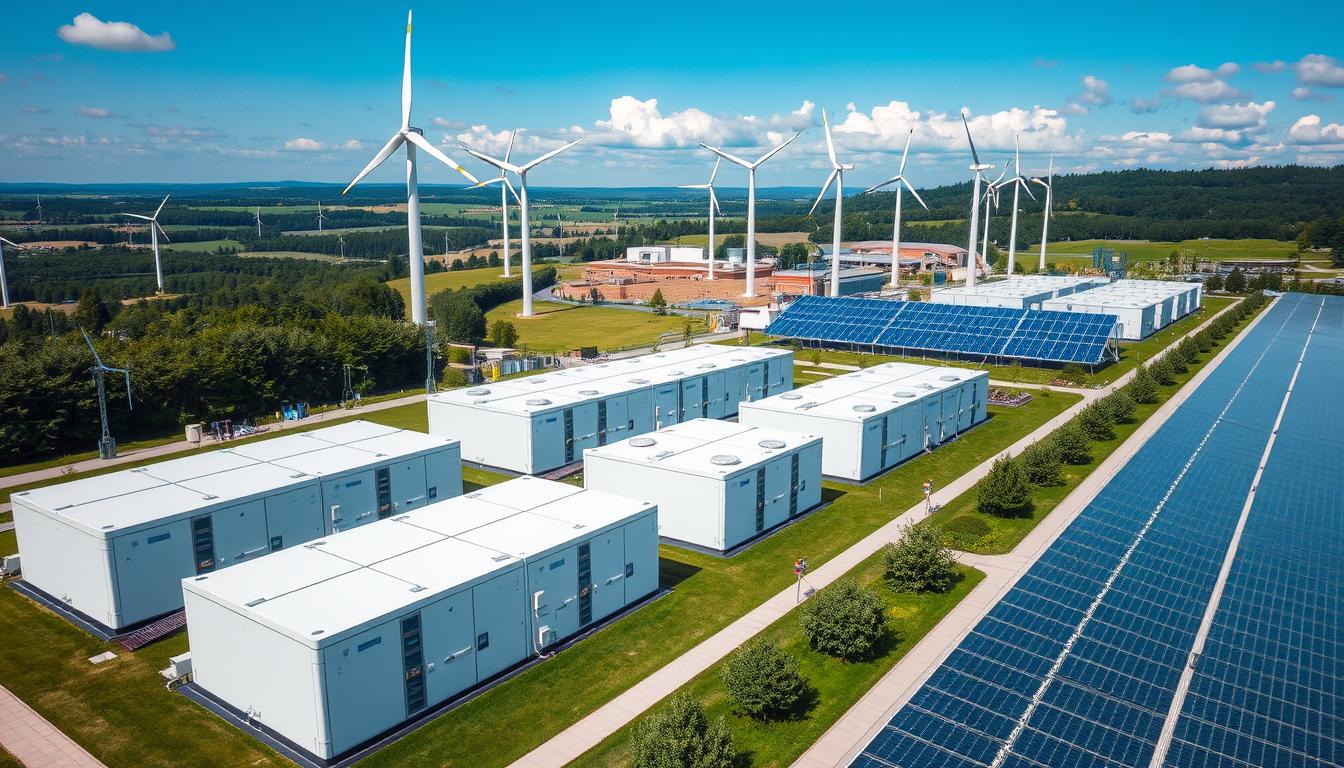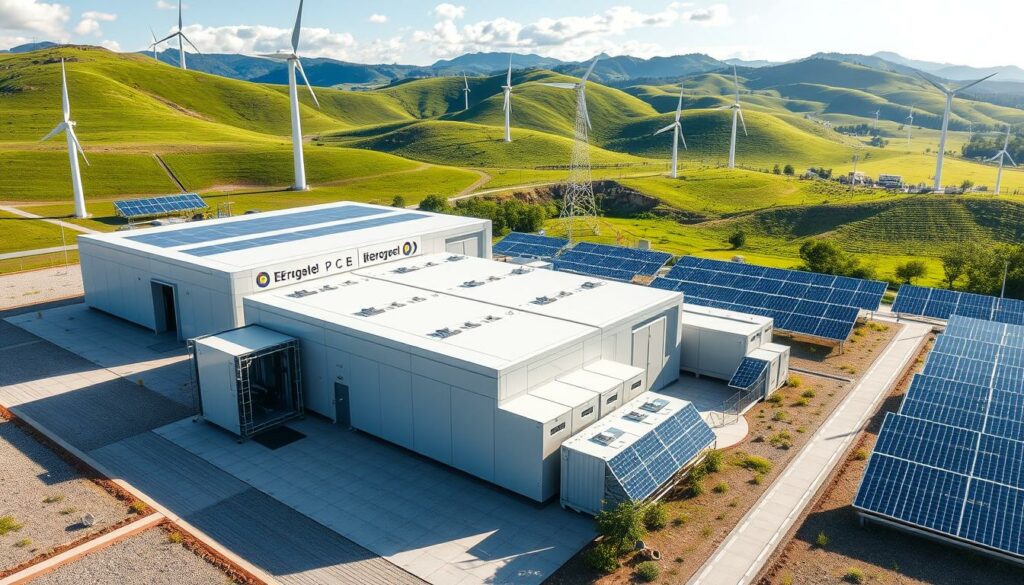Discover advanced and reliable energy storage solutions for a sustainable and efficient energy supply in Germany.

In Germany, the search for reliable energy storage solutions is becoming increasingly urgent in order to meet the growing demand for sustainable and stable energy supply. These solutions are crucial to meet the challenges of the energy transition and reduce dependence on fossil fuels. Innovative companies such as liota Energy in Oberhausen are actively contributing to the development of such technologies, which are essential for an environmentally friendly future. With over 5,000 projects worldwide proving the power of efficient storage technologies, it is clear that the industry is on a promising path.
The storage portfolio ranges from capacities from 10 kWh to 30 MWh and includes solutions such as those of TESVOLT, which is known as the largest provider of commercial and industrial energy storage solutions in Germany and Europe. The latest development is the TPS HV 80 E outdoor battery storage system, which has a service life of up to 30 years and can be used for various applications.
Key findings
- The importance of reliable energy storage solutions in the energy transition.
- Variety of capacities from 10 kWh to 30 MWh.
- Innovative energy storage technologies promote sustainable energy supply.
- The role of companies like liota Energy in the development of environmentally friendly solutions.
- The new outdoor battery storage system has a service life of up to 30 years.
The importance of reliable energy storage solutions
Reliable energy storage solutions are crucial for the successful implementation of the energy transition in Germany. These solutions help to balance the varying production volumes of renewable energy from sources such as solar and wind power. The weather dependence of these energy sources requires efficient storage systems to ensure a constant power supply.
Why energy storage systems are important for the energy transition
Energy storage systems play a central role in the integration of renewable energies into the electricity market. High-performance storage systems make it possible to store excess energy during periods of low demand and feed it back into the grid when demand is high. This not only improves grid stability, but also reduces costs for end users by replacing electricity from expensive, fuel-based backup generators.
The role of renewable energies in Germany's energy supply
The implementation of renewable energies is essential for the future of Germany's energy supply. In particular, the developments of lithium-ion batteries and other innovative storage solutions show great potential. Liota Energy in Oberhausen is an example of companies that are at the forefront of these technological advancements. Their systems offer solutions for various applications, from residential use to industrial requirements.
| Year | Storage Capacity (GW) | Installed battery storage (GWh) |
|---|---|---|
| 2019 | 2 | 100 |
| 2023 | 15 | N/A |
| 2030 (forecast) | 1194 | N/A |
Overall, current trends show that the demand for reliable storage solutions is growing rapidly, highlighting the need to further develop new technologies and approaches and drive the implementation of renewable energy.
Reliable energy storage solutions in Germany
The market for reliable energy storage solutions in Germany is multifaceted and dynamic. The integration of high-performance energy storage systems is crucial to meet the requirements of the energy transition. Various storage systems offer solutions to the challenge posed by fluctuations in energy production from renewable sources such as solar and wind. Innovative approaches are being driven by companies such as liota Energy in Oberhausen to maximize the availability of sustainable energy.
Overview of different storage systems
In Germany, there are several storage systems that are characterized by different technologies. These include:
- Pumped storage plants with a total capacity of about 9.6 gigawatts, which are considered the most cost-effective technology.
- Battery storage systems that are increasingly being installed in industrial and commercial operations to reduce carbon consumption and have backup power.
- Compressed air storage technology, which has hardly been used on a large scale so far, but holds potential for the future.
Battery storage systems make it possible to store energy at more convenient times and use it at peak times, which contributes significantly to reducing electricity bills. In particular, the flow battery technology, which can be discharged for up to 12 hours, is an interesting alternative to conventional lithium-ion batteries.
Market developments and trends in Germany
Market trends show a clear trend towards efficient storage technologies, which are crucial for the transition to a climate-neutral future. Germany plans to become climate-neutral by 2045, with storage solutions playing a central role. In particular, the growing share of wind and solar energy makes the need for reliable battery storage evident.
Technologies such as power-to-gas are gaining in importance, especially when the share of renewable energies reaches 60 to 70 percent. The most important initiatives aim to relieve the existing grid infrastructure and ensure a stable flow of energy. Companies like liota Energy are crucial for the implementation of innovative projects in this area. Information on innovative approaches can be found here.

| Storage Technology | Net Rated Power (GW) | Remarks |
|---|---|---|
| Pumped storage plants | 9,6 | Currently cost-effective |
| Battery storage | Variable | Growing use in various sectors |
| Compressed air reservoir | 0.1 (estimate) | Hardly used on a large scale |
Innovative energy storage technologies
Die Entwicklung innovativer Energiespeichertechnologien spielt eine entscheidende Rolle, um den Herausforderungen der Energieversorgung und den Anforderungen an umweltfreundliche speicherlösungen zu begegnen. Verschiedene Systeme bieten unterschiedlichste Möglichkeiten, um Energie effizient zu speichern und zu nutzen.
Focus on electrochemical energy storage systems
Electrochemical energy storage, especially lithium-ion batteries, is widely used, but their use raises questions about resource availability and sustainability. Alternative solutions, such as sodium or saltwater batteries, offer more environmentally friendly production methods and safer operating conditions. Green hydrogen stored with metal hydrides promises more cost-effective and space-saving storage.
Mechanical and thermal energy storage systems explained
Mechanical energy storage systems, such as Underground Gravity Energy Storage (UGES), use gravity to effectively store energy. With a potential capacity of up to 70 terawatt hours, these systems could make a significant contribution to the energy transition. The use of compressed air storage systems, as they have existed since the 1970s, is also showing promising results. One example is the plant in Huntorf, Lower Saxony, which is one of the world's rare compressed air storage systems.
Thermal energy storage systems offer another innovative approach. Projects such as the electrothermal energy storage system (ETES) in the Port of Hamburg store thermal energy with volcanic rock gravel and can thus provide energy for thousands of households. Increasing research in this area, for example at the German Aerospace Center, aims to store energy sustainably and effectively.
Sustainable energy storage solutions for the future
The use of green electricity is a key component in the German energy transition. In particular, the storage of renewable energies makes it possible to balance out the variable character of solar and wind energy and thus ensure a reliable energy supply. Innovative technologies and environmentally friendly storage solutions, such as sodium or saltwater batteries, are playing an increasingly important role in this. These systems not only have a positive impact on the environment, but are also economically beneficial and help reduce costs for consumers.
Green electricity and its storage potential
There are already more than 30 pumped storage power plants in Germany, which provide a total capacity of more than 6,500 megawatts and thus cover over 90% of the storage demand for renewable energies. These plants, with an efficiency of 75-80%, are crucial for the use of green electricity, as they can store excess energy and feed it back into the grid when needed. In addition, the German government is promoting the development of sustainable energy storage solutions in projects such as "TransDIB", which runs from February 2023 to January 2026 and is supported by the Federal Ministry of Education and Research with 2.3 million euros.
Eco-friendly storage solutions and their benefits
The increasing prevalence of lithium-ion batteries is replacing conventional lead-acid batteries and opening up new perspectives for electromobility and solar power storage. In Oberhausen, for example, companies such as liota Energy are working on implementing such technologies to promote environmentally friendly storage solutions. In addition, the Fraunhofer Institute for Ceramic Technologies and Systems IKTS has developed concepts for the recycling of batteries, which represents an important step towards more sustainable energy use. Investing in these technologies is essential to meet growing energy demand and minimise environmental impact as we work towards a greener future. For more information on this topic, please visit liota Energy's sustainable energy solutions page.